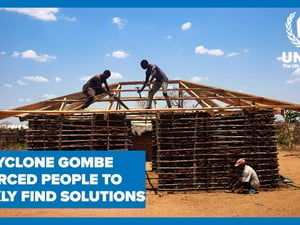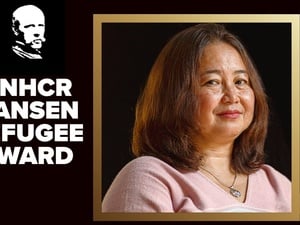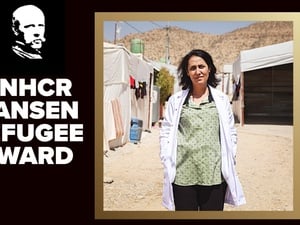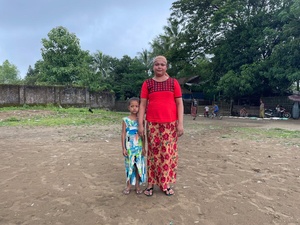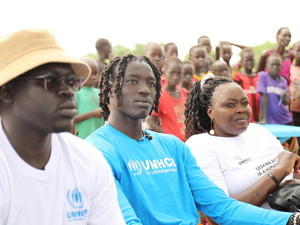UNHCR sends aid from Kenya to Somali town struggling with IDPs and disease
UNHCR sends aid from Kenya to Somali town struggling with IDPs and disease
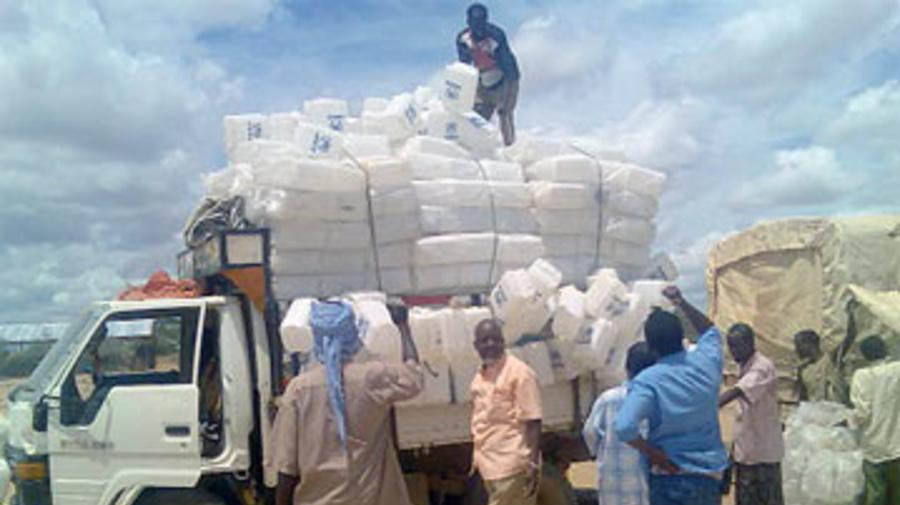
UNHCR emergency supplies are transferred at the border of Kenya before being taken on to the Somali town of Dobley.
NAIROBI, Kenya, April 19 (UNHCR) - The UN refugee agency has sent two truckloads of much-needed relief and medical supplies from Dadaab refugee camp in Kenya to the Somali town of Dobley, which is struggling to cope with an influx of 4,000 displaced Somalis and an outbreak of diarrhoea.
The outbreak of diarrhoea in the small town, 18 km from the Kenyan border, has so far claimed the lives of six children. According to local Somali non-governmental organizations (NGOs) operating in Dobley, 36 people - up from 19 three days ago - are now hospitalized at a makeshift isolation camp set up on the outskirts of Dobley to stem the spread of the disease. Medical supplies have run out at the isolation camp, prompting some families to take their children home, NGOs say.
The relief goods trucked on Wednesday from the Dadaab camp complex in north-eastern Kenya include medicines and medical supplies such as intravenous fluids, antibiotics, gloves, cotton wool and syringes. Other items in the consignment were 720 jerry cans, 1,600 pieces of soap, 250 blankets, 50 units of plastic sheets and 200 sleeping mats. The items were handed over to NGOs working in Somalia at Liboi, on the Kenya side of the Kenya/Somalia border and were then taken to Dobley.
Since the beginning of April, an estimated 4,000 displaced Somalis have camped at Dobley, following violence between the Transitional Federal Government (TFG) and insurgents in April. NGOs report more people fleeing insecurity in Mogadishu are arriving daily in Dobley. The border between Kenya and Somalia has remained closed since 3rd January 2007.
"We have worked closely with UN agencies working for Somalia to fill an urgent and temporary gap in the assistance already being provided by the UN and NGOs in Dobley," said Eddie Gedalof, UNHCR Acting Representative in Kenya. "Controlling the spread of disease on the Somalia side of the border also helps to control outbreaks inside Kenya."
The isolation camp in Dobley has two tents sheltering the 36 current patients. Health workers say that with only two tents available, recovering patients are forced to share the same space as newly admitted patients, raising fears of re-infection of recovering patients. In addition, the lack of an observation room means triage of patients brought to the isolation camp is carried out under a thorn tree, one of the few trees on the hot, arid and sandy landscape.
However, the emergency supplies sent from Kenya that have already been distributed by NGOs at the isolation camp include both medical supplies and plastic sheeting that will be used to provide more shelter for the hospitalized.
Health workers have continued to carry out sensitization campaigns in the small border town, advising residents to bring family members to the isolation camp at the first sign of diarrhoea and vomiting.
Elsewhere in Somalia, UNHCR is finalizing arrangements to start distribution of more than 28 tons of relief supplies that were last week airlifted to Baidoa from the refugee agency's emergency stockpile in Dubai. The supplies have been trucked to Afgoye, another Somali town struggling to cope with an influx of some 40,000 people from Mogadishu.
At least 213,000 Somalis are believed to have fled Mogadishu since the beginning of February. Nearly 100,000 of them have sought safety in the adjacent provinces of Middle and Lower Shabelle (Shabelle Dhexe and Shabelle Hoose). As towns such as Afgoye have grown increasingly crowded, new arrivals are compelled to move further north, notably towards the towns of Baidoa and Balcad.
These figures, compiled by UNHCR from information provided by a monitoring network of local NGOs in Somalia, may rise as people continue to flee Mogadishu, where a truce has been holding for about two weeks despite sporadic gunfire.
Insecurity in parts of Mogadishu has continued to jeopardize humanitarian access to the Somali capital and surrounding regions, making the plight of civilians all the more desperate.
By Millicent Mutuli in Nairobi


